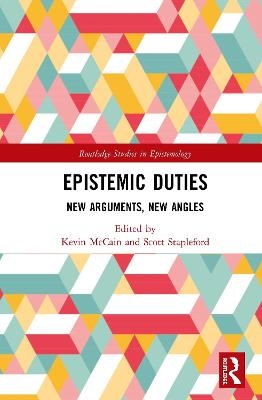
Epistemic Duties
Routledge (Verlag)
978-0-367-14110-3 (ISBN)
There are arguably moral, legal, and prudential constraints on behavior. But are there epistemic constraints on belief? Are there any requirements arising from intellectual considerations alone? This volume includes original essays written by top epistemologists that address this and closely related questions from a variety of new, sometimes unexpected, angles. It features a wide variety of positions, ranging from arguments for and against the existence of purely epistemic requirements, reductions of epistemic requirements to moral or prudential requirements, the biological foundations of epistemic requirements, extensions of the scope of epistemic requirements to include such things as open-mindedness, eradication of implicit bias and interpersonal duties to object, to new applications such as epistemic requirements pertaining to storytelling, testimony, and fundamentalist beliefs. Anyone interested in the nature of responsibility, belief, or epistemic normativity will find a range of useful arguments and fresh ideas in this cutting-edge anthology.
Chapter 14 of this book is freely available as a downloadable Open Access PDF at http://www.taylorfrancis.com under a Creative Commons Attribution-Non Commercial-No Derivatives (CC-BY-NC-ND) 4.0 license.
Kevin McCain is Associate Professor of Philosophy at the University of Alabama at Birmingham. His published works include: Evidentialism and Epistemic Justification (Routledge, 2014), The Nature of Scientific Knowledge: An Explanatory Approach (2016), and with Kostas Kampourakis Uncertainty: How It Makes Science Advance (2019). Scott Stapleford is Professor of Philosophy at St. Thomas University, Fredericton. He is the author of Kant’s Transcendental Arguments: Disciplining Pure Reason (2008), coauthor (with Tyron Goldschmidt) of Berkeley’s Principles: Expanded and Explained (Routledge, 2016) and Hume’s Enquiry: Expanded and Explained (Routledge, forthcoming), and coauthor (with Lorne Falkenstein and Molly Kao) of Logic Works: A Rigorous Introduction to Formal Logic (Routledge, forthcoming).
Introductory Note
Kevin McCain and Scott Stapleford
Part I: The Nature of Epistemic Duty
1 Epistemic Duty, Justified Belief, and Voluntary Control
Matthias Steup
2 Believing Badly: Doxastic Duties are not Epistemic Duties
Miriam Schleifer McCormick
3 Evading the Doxastic Puzzle by Deflating Epistemic Normativity
Luis Oliveira
4 Epistemic Tension and Epistemic Duty: A Rossian Account
Mark T. Nelson
5 Intellectual Responsibility and the Scope of the Will
Robert Audi
6 We Are Like American Robins
Ema Sullivan-Bissett
Part II: Epistemic Duties of Individuals
7 Bound by the Evidence
Scott Stapleford and Kevin McCain
8 Epistemic Duty and Implicit Bias
Lindsay Rettler and Bradley Rettler
9 Robust Justification
Jonathan Matheson
10 Ought to Believe vs. Ought to Reflect
Anthony Robert Booth
11 Wisdom, Open-Mindedness, and Epistemic Duty
Sharon Ryan
12 On What We Should Believe (And When (and Why) We Should Believe What We Know We Should Not Believe)
Clayton Littlejohn
13 The Normative Ground of the Evidential Ought
Anne Meylan
Part III: Social Epistemic Duties
14 Responsibility for Fundamentalist Belief
Rik Peels
15 Trust, Testimony, and Reasons for Belief
Rebecca Wallbank and Andrew Reisner
16 When the Personal Becomes Political: How Do We Fulfil Our Epistemic Duties Relative to the Use of Autobiographical Stories in Public Debates?
Lisa Bortolotti and Sophie Stammers
17 Dialectical Responsibility and Regress Skepticism
Scott Aikin
18 Epistemic Duties Regarding Others
Jennifer Lackey
| Erscheinungsdatum | 12.10.2020 |
|---|---|
| Reihe/Serie | Routledge Studies in Epistemology |
| Zusatzinfo | 4 Tables, black and white |
| Verlagsort | London |
| Sprache | englisch |
| Maße | 152 x 229 mm |
| Gewicht | 453 g |
| Themenwelt | Geisteswissenschaften ► Philosophie ► Erkenntnistheorie / Wissenschaftstheorie |
| Geisteswissenschaften ► Philosophie ► Ethik | |
| Geisteswissenschaften ► Philosophie ► Sprachphilosophie | |
| ISBN-10 | 0-367-14110-8 / 0367141108 |
| ISBN-13 | 978-0-367-14110-3 / 9780367141103 |
| Zustand | Neuware |
| Haben Sie eine Frage zum Produkt? |
aus dem Bereich


![Was heißt Denken?. Vorlesung Wintersemester 1951/52. [Was bedeutet das alles?] - Martin Heidegger](/media/113619842)